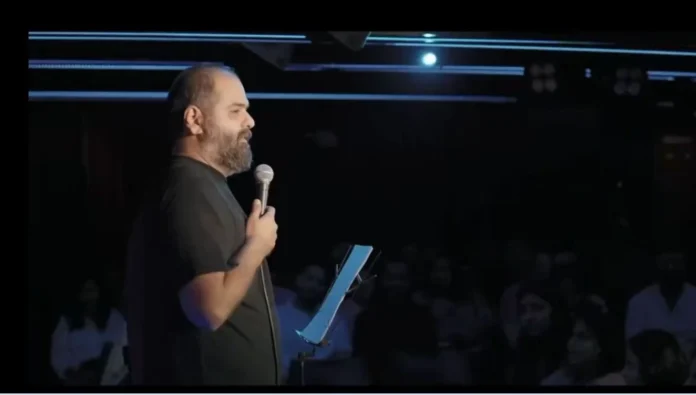By Vikram Kilpady
Maharashtra Deputy Chief Minister Eknath Shinde doesn’t need enemies—his own supporters seem more than capable of doing the damage. A pointed yet indirect jab at Shinde by stand-up comedian Kunal Kamra was blown out of proportion, triggering a free speech firestorm. The comedian’s remarks led to an FIR against him and vandalism at The Habitat Centre in Mumbai, a venue where he often performed. Irony, it seems, was left gasping for breath.
Instead of letting satire slide, Shinde’s supporters ensured the spotlight stayed firmly on him, reviving memories of his dramatic 2022 exit from the Shiv Sena with 40 MLAs in tow. Kamra, unfazed, took to Instagram to clarify that neither his venue nor any political party had control over what he said. In classic Kamra fashion, he added, “Attacking a venue for a comedian’s words is as senseless as overturning a lorry carrying tomatoes because you didn’t like the butter chicken you were served.” Luckily, his culinary analogy didn’t spark further outrage—yet.
Refusing to apologize, Kamra insisted that freedom of speech wasn’t reserved for praising the powerful. “Your inability to take a joke at the expense of a public figure doesn’t change my right to make it,” he said, likening India’s political system to a circus.
Doubling down, Kamra released a recorded phone call with a Shiv Sena supporter spewing expletives, demanding to know what he had said against Shinde. When Kamra coolly corrected him—“He’s Deputy CM now”—the enraged caller demanded his location. Kamra’s deadpan response: “Come to Tamil Nadu.” Cue a flurry of censored bleeps.
For those who remember, Tamils were once a prime target of the Shiv Sena, back when the party, founded by a cartoonist (Bal Thackeray), was a small nativist outfit railing against South Indians taking jobs in Mumbai. The targets have changed over time—from Tamils and Malayalis to Muslims—as the country’s political climate shifted rightward.
Kamra’s mention of Tamil Nadu seemed an indirect nod to the DMK, led by Chief Minister MK Stalin, which has positioned itself at the forefront of anti-BJP resistance, especially against the centre’s push for Hindi in schools. However, even in Tamil Nadu, free speech is no safe bet.
The DMK government has cracked down on critics like YouTube commentator Savukku Shankar for targeting the ruling party and its first family. Kamra, possibly seeing Tamil Nadu as a free-speech haven, found himself inadvertently dragging the state’s police into the controversy.
Meanwhile, Tamil media house Vikatan had its website blocked in February after its magazine Vikatan Plus ran a cover cartoon of Prime Minister Narendra Modi—handcuffed and shackled, seated beside Donald Trump—to highlight the deportation of Indian immigrants from the US. After a complaint from Tamil Nadu BJP chief Annamalai, the Information & Broadcasting Ministry took action. On March 6, the Madras High Court intervened, ordering the site’s restoration, except for the cartoon.
This isn’t the first time free speech has been put on trial. In February, YouTuber Ranveer Allahbadia (aka Beer Biceps) made an obscene meta-joke that went viral among Gen Z incels, drawing the Supreme Court’s ire over its obscenity. The host of the show, India’s Got Latent, is now answering to both the National Commission for Women and Maharashtra’s cyber police.
Before Kamra, it was comedian Munawar Faruqui who bore the brunt of state-sponsored intolerance. His stand-up shows, critical of the BJP, were repeatedly shut down.
In an ironic twist, Faruqui later appeared on Lock Upp, a reality show hosted by BJP MP Kangana Ranaut, seemingly as penance. His life has since returned to normal—unlike the people of Manipur.
India’s Constitution, under Article 19(1)(a), guarantees freedom of speech and expression, but Article 19(2) places “reasonable restrictions” in the interest of sovereignty, public order, morality, and more. Unlike the absolute First Amendment protections in the US, Indian free speech laws offer ample room for state interference.
A recurring theme in these censorship sagas is the uneven application of outrage. Kamra and his fellow comedians have taken as many digs at the Congress as at the BJP, but they only seem to face backlash when targeting right-wing figures. Even the much-criticized Section 66A of the IT Act—used under UPA rule to jail cartoonists—was ultimately struck down by the Supreme Court in the Shreya Singhal case.
Whether it’s the state or its self-appointed enforcers, censorship is alive and well in India. Kamra, Vikatan, and others have learned the hard way that satire is only tolerated when it spares the ruling class. Nostalgists who recall Nehru laughing off Shankar’s cartoons should abandon such hopes—today’s political landscape is defined by hypersensitivity, where perceived insults weigh heavier than jokes said in jest.


